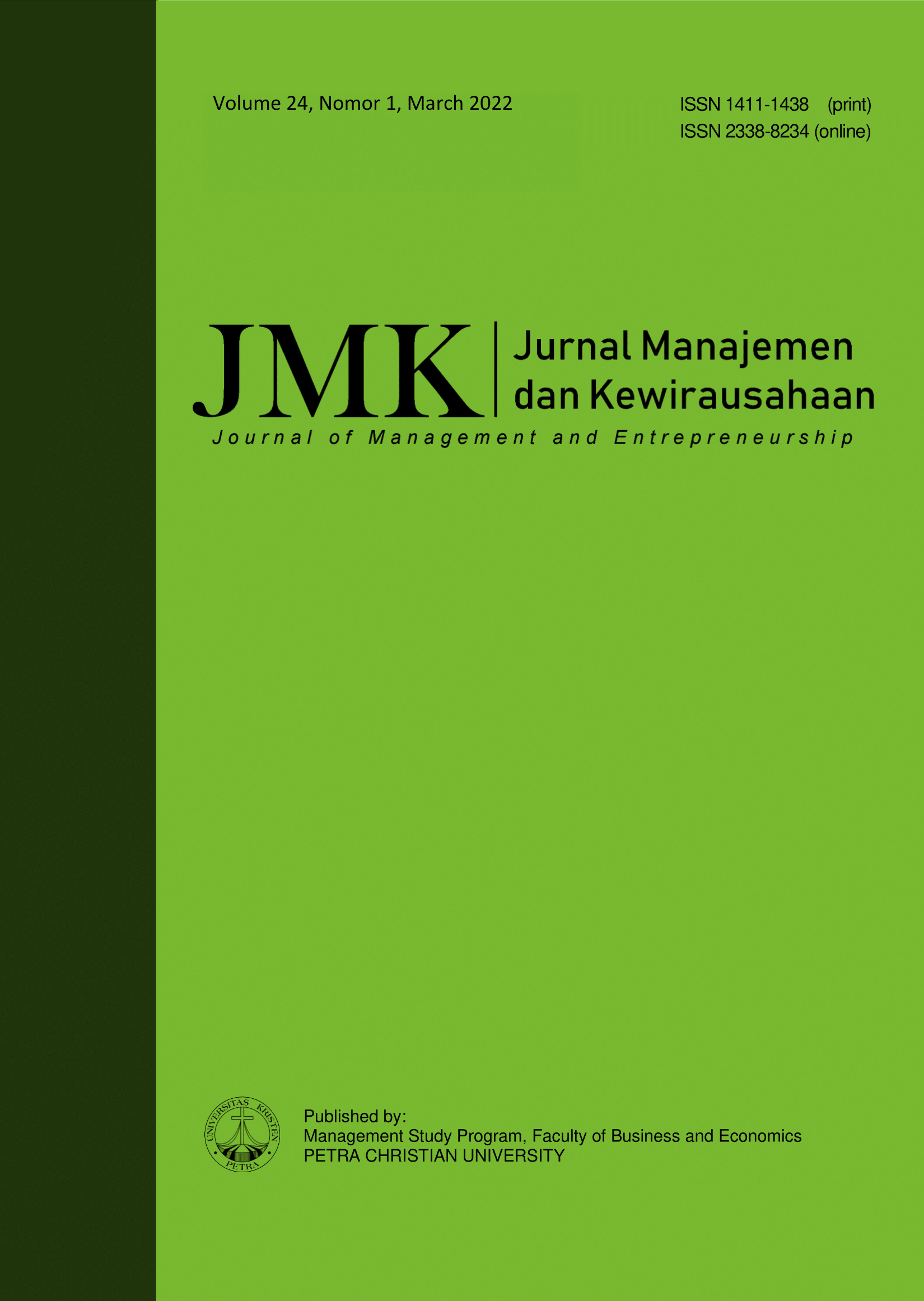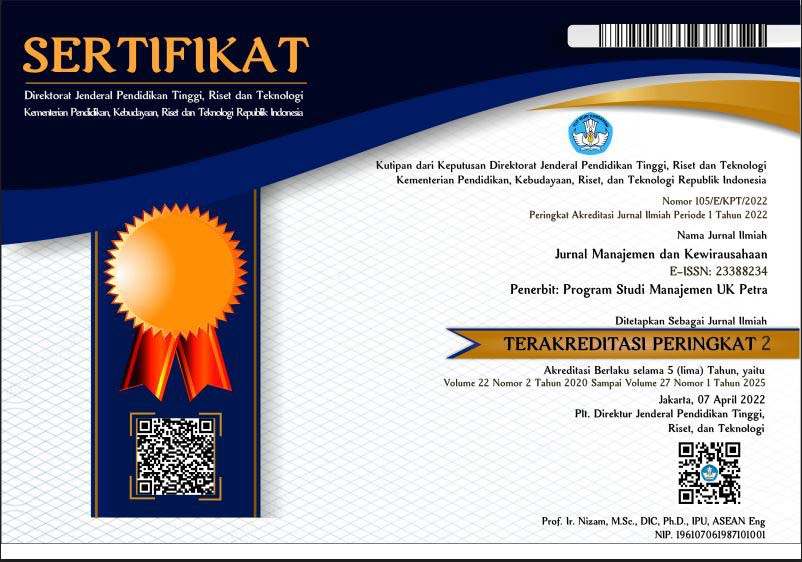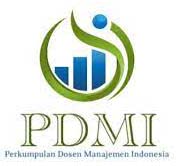THE ENTREPRENEURIAL RESILIENCE STUDY ON THE YOUNG NASCENT ENTREPRENEURS
 :
:
https://doi.org/10.9744/jmk.24.2.129-137
Keywords:
Nascent entrepreneur, self-efficacy, entrepreneurial passion, entrepreneurial resilienceAbstract
Changes occur in human existence, particularly in lifestyle, during this pandemic. Changes occur in the workplace on a daily basis. Workers and companies are facing difficulties in surviving the pandemic. The purpose of this study was to assess the link between entrepreneurial self-efficacy, entrepreneurial passion, and entrepreneurial resilience in young nascent entrepreneurs during the COVID-19 pandemic. There were 216 sampels of young nascent entrepreneurs of age 19 to 22 to support this research. SPSS Software was used for data analysis and processing. The result showed during the pandemic, the entrepreneurial self-efficacy variable had a positive significant influence on the entrepreneurial resilience, and the entrepreneurial passion had a positive significant influence on the entrepreneurial resilience. Based on the study and analysis, hypotheses 1 and hypothesis 2 were accepted since they had a substantial effect on the entrepreneurial resilience variable, either partially or simultaneously. During the pandemic, a young nascent entrepreneur needed to remain inventive and able to create opportunities in operating their businesses. Further study on other aspects that can affect entrepreneurial resilience was adviseable.
References
Bachmann, A. K., Maran, T., Furtner, M., Brem, A., & Welte, M. (2020). Improving entrepreneurial self-efficacy and the attitude towards starting a business venture. Review of Managerial Science, 15(6), 07–27. https://doi.org/10.1007/s11846-02 0-00394-0.
Borbolla-Albores, A., & Reyes-Mercado, P. (2022). Entrepreneurial failure and resilience: A continuous interplay between rigidity and flexibility. Jurnal Manajemen dan Kewirausahaan, 24(1), 1–14. https://doi.org/10.9744/jmk.24.1.1-14
Brinckmann, J., & Kim, S. M. (2015). Why we plan: the impact of nascent entrepreneurs' cognitive characteristics and human capital on business planning. Strategic Entrepreneurship Journal, 9 (2), 153–166. https://doi.org/10.1002/sej.1197
Cardon, M., Wincent, J., & Drnovsek, M. (2009). The nature and experience of entrepreneurial passion. The Academy of Management Review, 34, 511–532. http://dx.doi.org/10.5465/AMR.2009.40633 190
Caza, A., Caza, B. B., & Baloochi, M. E. (2020). Resilient personality: Is grit a source of resilience? In Powley, E.H., Caza, B.B. & Caza, A. (Eds.), Research Handbook on Organizational Resilien-ce (25–38). Northampton, MA: Edward Elgar.
Chadwick, I. C., & Raver, J. L. (2018). Psychological resilience and its downstream effects for business survival in nascent entrepreneurship. Entrepre¬ne-urship Theory and Practice, 44(2), 233–255. https://doi.org/10.1177/1042258718801597
Djourova, N. P., Molina, I. R., Santamatilde, N. T., & Abate, G. (2020). Self-efficacy and resilience: Me¬diating mechanisms in the relationship between the transformational leadership dimensions and well-being. Journal of Leadership and Organizational Studies, 27(3), 256–270. https://doi.org/10.1177/1548051819849002
Emrizal, Taifur, W. D., Rahman, H., Ridwan, E., & Devianto, D. (2020). Entrepreneurial resilience: The role of entrepreneurial self-efficacy and entrepreneurial passion in disaster prone areas. International Journal of Entrepreneurship, 24(5), 1–11.
Fatoki, O. (2018). The impact of entrepreneurial resilience on the success of small and medium enter-prises in South Africa. Sustainability (Switzerland), 10(7), 2527. https://doi.org/10.3390/su10072527
Fesharaki, F. (2019). Entrepreneurial passion, self-efficacy, and spiritual intelligence among Iranian SME owner–managers. Psychological Studies, 64(4), 429–435. https://doi.org/10.1007/s12646-019-00507-0
Fisher, R., Merlot, E., & Johnson, L. W. (2018). The obsessive and harmonious nature of entrepreneurial passion. International Journal of Entrepreneurial Behavior & Research, 24(1), 22–40. https: //doi.org/10.1108/ijebr-01-2017-0011
Ghozali, I. (2019). Aplikasi analisis multivariat. Semarang: Universitas Diponegoro.
Griffith, E. (2020). Start-ups are pummeled in the ʻgreat unwinding'. New York Times. Retrieved from https://www.nytimes.com/2020/04/01/technology/virus-start-ups-pummeledlay-offsunwinding.html
Ho, V. T., & Pollack, J. M. (2013). Passion isn’t always a good thing: Examining entrepreneurs’ network centrality and financial performance with a dua-listic model of passion. Journal of Management Studies, 51(3), 433–459. https://doi.org/10.1111/joms.12062
Kollmann, T., Stöckmann, C., & Kensbock, J. M. (2017). Fear of failure as a mediator of the rela-tionship between obstacles and nascent entrepre¬neurial activity—An experimental approach. Journal of Business Venturing, 32(3), 280–301.
Liñán, F., & Jaén, I. (2020). The Covid-19 pandemic and entrepreneurship: Some reflections. International Journal of Emerging Markets, 17(5), 1165 –1174. https://doi.org/10.1108/IJOEM-05-2020-0491
Neneh, B. N. (2020). Entrepreneurial self-efficacy and a student’s predisposition to choose an entrepre-neurial career path: The role of self-perceived employability. Education and Training, 62(5), 559–580. https://doi.org/10.1108/ET-06-2019-0108.
Newman, A., Obschonka, M., Moeller, J., & Chandan, G. G. (2021). Entrepreneurial passion: A review, synthesis, and agenda for future research. Applied Psychology, 70(2), 816–860. https://doi.org/10.1111/apps.12236.
Rahman, S. A., Taghizadeh, S. K., Alam, M. M. D., & Khan, G. M. (2020). The functionality of entre-preneurial passion and entrepreneurial bricolage on micro-entrepreneur’s wellbeing. Journal of Small Business Strategy, 30(03), 47–64.
Reynolds, P. D., Hay, M., Bygrave, W. D., Camp, S. M., & Autio, E. (2000). Global entrepreneurship monitor: 2000 executive report. Kauffman Center Entrepreneurial Leadership Ewing Kaufman Found. https://doi.org/10.13140/RG.2.1.3549.9043
Roy, R., & Das, N. (2022). Exploring entrepreneurial intention among engineering students in India: a multiple basket approach. International Journal of Technology and Design Education, 32(1), 555–584. https://doi.org/10.1007/s10798-020-09596-9
Santoro, G., Ferraris, A., Giudice, M. D., & Schiavone, F. (2020). Self-efficacy and success of disadvan-taged entrepreneurs: The moderating role of resilience. European Management Review, 17(3), 719–732. https://doi.org/10.1111/emre.12394
Soomro, B. A., Shah, N., & Anwar, S. (2018). Determining the impact of entrepreneurial adversity and psychological capital on entrepreneurial resilience among entrepreneurs of Pakistan. Journal of Asia Entrepreneurship and Sustainability, XIV (2), 95–116.
Sugiyono. (2019). Metode penelitian kuantitatif kualitatif dan R&D. Bandung: Alfabeta.
Wennekers, S., van Wennekers, A., Thurik, R., & Reynolds, P. (2005). Nascent entrepreneurship and the level of economic development. Small Business Economics, 24(3), 293–309. https://doi.org/10.1007/s11187-005-1994-8
Wilson, R. S., Krueger, K. R., Arnold, S. E., Schneider, J. A., Kelly, J. F., Barnes, L. L., Tang, Y., & Ben-nett, D. A. (2007). Loneliness and risk of Alzheimer disease. Arch Gen Psychiatry, 64(2), 234–240. doi: 10.1001/archpsyc.64.2.234
Downloads
Published
How to Cite
Issue
Section
License
Authors who publish on this journal agree to the following terms:
- Authors retain copyright and grant the journal right of first publication with the work simultaneously licensed under a Creative Commons Attribution License that allows others to share the work with an acknowledgement of the work's authorship and initial publication in this journal.
- Authors are able to enter into separate, additional contractual arrangements for the non-exclusive distribution of the journal's published version of the work (e.g., post it to an institutional repository or publish it in a book), with an acknowledgement of its initial publication in this journal.
- Authors are permitted and encouraged to post their work online (e.g., in institutional repositories or on their website) prior to and during the submission process, as it can lead to productive exchanges, as well as earlier and greater citation of published work (See The Effect of Open Access).


















